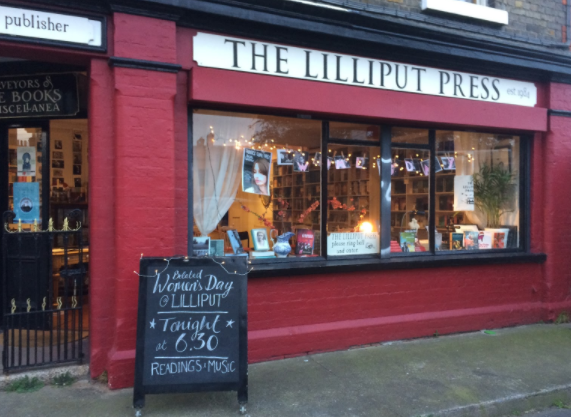
Last night, local publishing company The Lilliput Press hosted “Words by Women” in honour of International Women’s Day. This event sought to illuminate the writing of local established and up-and-coming female writers. The cosy front room of Lilliput Press served as the setting for the event, as the audience looked out onto the Stoneybatter terraced street. The warmness of the room radiated from the fairy lights, deliberately mismatched furniture, and ornate shelves of past publications marking Lilliput’s legacy and support for Irish writers. The event was in aid of the Dublin Rape Crisis Centre, which Publishing Manager Suzy Freeman addressed at the beginning and at the end of the night, reminding the audience of the realities that women and men face behind the fiction.
The evening began with musician Inni-K, who released her debut album The King Has Two Horse’s Ears in 2015 and has also featured on RTÉ’s Other Voices Her first song, “Find Your Beat” was sung in Irish, accompanied by ukulele strumming and audience percussion. Inni-K’s voice is dulcet and completes the charm that her ukulele oozes. She uses nature as a source for her music, and seeks images of femininity in her surroundings. Following Inni-K was poet Kerrie O’Brien, who read from her recently published collection, Illuminate. The collection was written while O’Brien was housebound for six months due to an accident, something that she appreciates in hindsight. Her poems evoke an effort to communicate with and appreciate older generations, as she dedicates two poems to her grandmother and grandfather respectively.
Next, Freeman introduced Sydney Weinberg, whom she referred to amicably as a “Stoneybatter local”. Weinberg reads excerpts from an essay she wrote on travelling to Tallinn, Estonia to help an old friend run a family business. Comedic chaos ensued thanks to language and cultural barriers, leading to memorable lines such as “we’re each loners with potent but different genes” and “it now resembled an embassy for European hipsters”. At this point, the audience was giggling at the right cue, but it was Maggie Armstrong who brings the house down. Armstrong is a theatre critic for the Irish Independent but aside from this she writes spectacularly sly short stories such as “Irish Sex”. This story encapsulates the high expectations women have on nights out and how they’re always a let down: “I always felt I had failed myself, the night, and the driver if I was in the taxi alone.” Even the highly anticipated event of sex is a let down because the partner had been snorting drugs all night long. After her excerpt, Armstrong admitted that the incident had happened to a friend, and it wasn’t from personal experience.
Nicole Flattery took to the stage next, a graduate from the M Phil Creative Writing course in Trinity. She read an excerpt from her short story “Show Them a Good Time”, which takes place in a petrol station. The story is delightfully subversive and the depth to Flattery’s setting and characters indicates a carefully thought-out world in which her character is at odds with authority, and considers herself to be more aged and developed than her parents. Her character’s lack of successful social engagements can be summed up with the line: “I had a personality best suited to short interactions.” Continuing on with short story excerpts, novelist Sarah Maria Griffin read out a story from the publication Guts which was released specifically for International Women’s Day. Her story is based on her adolescence and experience of not quite fitting into reality and using video games as an escape. Griffin strikes the balance between painful tragedy and humour as she caricatures stuck-up co-workers while highlighting the humanity in others. The coming-of-age story makes use of video game metaphors, as she compares virtual interactions to those in real life: “That’s how the algorithm works. That’s now how life works.”
The most powerful presence of the night was the poetry by Rosita Sweetnam, who Freeman introduced as “one of the pioneers of the original Irish feminist movement in the 1970s”. Sweetnam is currently working on a feminist memoir of 1960s Ireland, and in the midst of her research on the radical era, she felt numb from last week’s breaking news on the Tuam Babies scandal. She read a moving poem dedicated to the babies entitled “An Irish Abortion” in which the speaker is one of the babies “clothed in the dripping shit of the unloved, unwanted” who travels to the Vatican despite all efforts from a female God to abort her, “you even survived the nuns”. Sweetnam closed off the evening with an ode to Dublin entitled, “Dublin, my Dublin” in which she captures the many tones and hues of the city from the swinging sixties up to the present day. She listed off the names of many male Irish poets associated with the city, followed by “me”, and notes the glorious and thought-provoking line, “If men got pregnant, abortion would be a sacrament.” This ode to Dublin epitomized the eclectic, yet inclusive tone of the evening in which those whose voices had previously been hushed, were now being heard.






